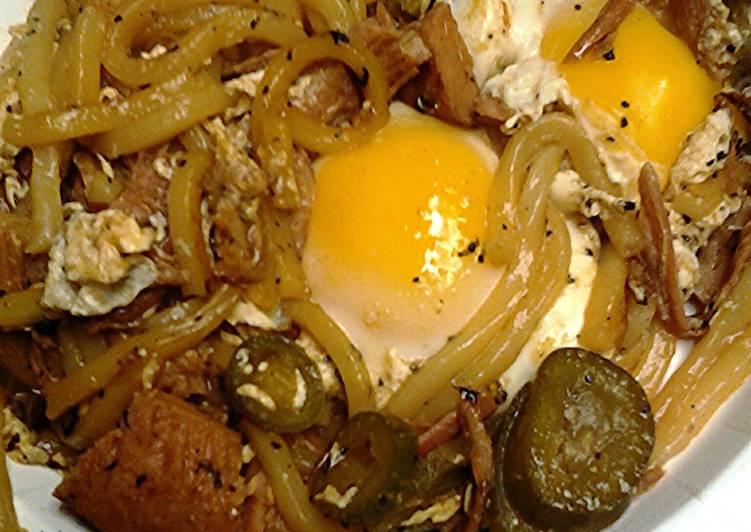Ham, Eggs and Udon Noodles. Ham and Vegetable Udon Noodle SoupSparkle. Leftover ham gets a second chance to please your palate in this simple casserole of egg noodles, Cheddar cheese and cream of mushroom soup. Add sweet green peas for color and flavor.
 I think homemade noodles are truly a delight.
You can adjust the thickness, width, and texture of the noodles to your liking, all while avoiding the usage.
Oh, eggy Udon noodles, I do love you so.
You can have Ham, Eggs and Udon Noodles using 9 ingredients and 3 steps. Here is how you cook it.
I think homemade noodles are truly a delight.
You can adjust the thickness, width, and texture of the noodles to your liking, all while avoiding the usage.
Oh, eggy Udon noodles, I do love you so.
You can have Ham, Eggs and Udon Noodles using 9 ingredients and 3 steps. Here is how you cook it.
Ingredients of Ham, Eggs and Udon Noodles
- You need 4 oz of Udon noodles.
- It's 4 oz of leftover smoked ham.
- It's 4 oz of jalapeño peppers.
- It's 2 tsp of coarse ground black pepper.
- Prepare 3 large of eggs.
- You need 1 tsp of salt.
- Prepare 1/3 cup of water.
- You need 1/4 cup of water.
- Prepare 1 1/2 tsp of granulated garlic powder.
Hearty, delightfully chewy udon noodles are a Japanese comfort food staple perfect for pairing with umami-rich broths. Here, we're making our udon noodle soup with white miso—a Japanese We're finishing each bowl with a soft-boiled egg, whose creamy, rich yolk is perfect for stirring into the broth. Easy & Tasty Udon Noodles with Egg recipe! Learn how to make these delish savory noodles in a snap with an easy step by step tutorial video.
Ham, Eggs and Udon Noodles instructions
- In a frying pan add the ham and let heat through. Add Udon noodles let get a little brown, then add 1/3 cup water so noodles absorb flavor of ham. Add spices, mix well, add jalapeños and their juices - I used canned.
- Add eggs but don't break the yolk. Move the other ingredients from around the eggs, splash the liquid in pan on top of eggs repeatedly.
- Add the 1/4 cup of water cove let steam for 2 minutes. Remove from heat and serve immediately.
Bring water to a boil in a medium saucepan over high heat. Remove from heat and drain in a colander. Oyako udon is one of my favorite Japanese noodle dish. This noodle dish is so simple to make and very delicious. Oyako means parents and children in Japanese.